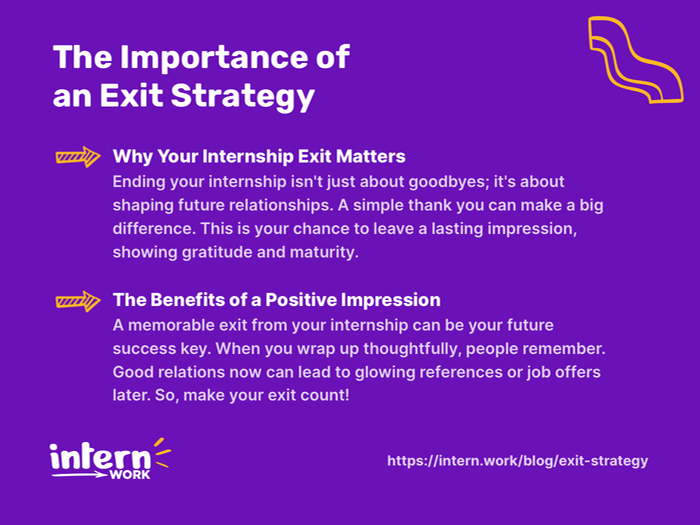
Do you have an internship coming to an end? Congratulations! You’ve worked hard and gained valuable experience. Now it’s time to focus on your exit strategy and make sure you leave a lasting impression. Why is this important, you ask? Let’s dive into it and explore the significance of a remarkable internship exit.
Understanding the Importance of an Exit Strategy
An internship isn’t just a temporary gig. It’s your stepping stone into the professional world. Whether you stay in your current company or explore other opportunities, your exit strategy is crucial in shaping your future. A positive exit can lead to invaluable references, networking connections, and potential job offers.
But what exactly does an exit strategy entail? It’s not just about saying goodbye and moving on. Your exit strategy encompasses thoughtful actions and considerations that can leave a lasting impact on your professional reputation.
Why Your Internship Exit Matters
Your internship exit is more than just saying farewell to your colleagues. It’s about leaving a positive impression and showing gratitude for the experience. Remember, the people you’ve worked with might become your professional network in the future. Going on a positive note makes it more likely for them to continue supporting you throughout your career.
Consider the relationships you’ve built during your internship when crafting your exit strategy. Take the time to express your appreciation to your colleagues and supervisors. A heartfelt thank you note or a small token of appreciation can go a long way in leaving a positive impression.
Furthermore, consider the knowledge and skills you’ve gained during your internship. Reflect on how these experiences have shaped you as a professional. Take the opportunity to share your growth and express your enthusiasm for future endeavors. By leaving on a positive note, you strengthen your relationships and showcase your professionalism and maturity.
The Long-Term Benefits of a Positive Impression
When you leave a lasting impression, you set yourself up for success. Employers value interns with professionalism, teamwork, and a strong work ethic. Ensuring your exit strategy is thoughtful and intentional will enhance your reputation and increase your chances of landing future opportunities.
Consider the potential references you may need in the future. By maintaining positive relationships with your internship supervisors and colleagues, you create a network of individuals who can vouch for your skills and character. These references can be invaluable when applying for jobs or furthering your education.
Additionally, a positive exit can lead to unexpected opportunities. You never know when a former colleague or supervisor might contact you with a job offer or a networking opportunity. You open the door for future collaborations and connections by leaving on good terms.
Ultimately, your internship exit is more than just a formality. It’s an opportunity to leave a lasting impression and set yourself up for success. So, take the time to carefully consider your exit strategy and leave on a positive note. Your future self will thank you.

Your internship exit is important for shaping your future. Leave a positive impression by showing gratitude to colleagues and supervisors, reflecting on your growth, and maintaining relationships. A positive exit sets you up for success, with potential references and unexpected opportunities.
Preparing Your Exit Strategy
Now that you understand the importance of your internship exit, it’s time to prepare your strategy. Let’s break it down into a few essential steps.
Evaluating Your Internship Experience
Take some time to reflect on your internship journey. What skills did you acquire? What challenges did you overcome? Understanding your personal growth and the knowledge you’ve gained will help you showcase your value to future employers.
Reflecting on your internship experience allows you to appreciate how far you’ve come and identify areas for improvement. Consider the projects you worked on, the tasks you completed, and the feedback you received. This self-assessment will help you articulate your achievements and highlight your strengths when discussing your internship with potential employers.
Furthermore, think about the skills you developed during your internship. Did you gain proficiency in a specific software or programming language? Did you enhance your communication or problem-solving abilities? These acquired skills will be valuable assets in your future career, so include them in your resume and cover letter.
Identifying Key Relationships to Maintain
You’ve likely built relationships with supervisors, mentors, and colleagues during your internship. These connections can be instrumental in your professional development, so it’s essential to identify which relationships you want to maintain.
Consider the individuals who have provided guidance and support throughout your internship. These mentors can offer valuable advice, serve as references, or even help you find future job opportunities. Contact them periodically to stay connected and express your gratitude for their guidance.
Additionally, remember your fellow interns and colleagues. Building a strong professional network within your industry is crucial for future collaborations and career growth. Connect with them on professional networking platforms like LinkedIn and attend industry events to nurture these relationships.
Setting Post-Internship Goals
What do you want to accomplish after your internship? Now is the time to set specific goals to guide your post-internship journey.
First and foremost, consider your career aspirations. Do you aim to secure a full-time position in the company where you interned? If so, outline the steps you need to take to make yourself a strong candidate for a permanent role. This may include updating your resume, preparing for interviews, and networking with relevant professionals in the company.
If you’re not looking for immediate employment, think about other goals you want to achieve. Are you considering pursuing further education to enhance your skills and knowledge? Research different programs or certifications that align with your career interests and make a plan to apply.
Alternatively, you could explore different internship opportunities for exposure to various industries or roles. Research companies that offer internships in your field of interest and create a timeline for when you will start applying.
Setting clear and achievable goals allows you to stay focused and motivated during your post-internship phase. Regularly reassess your goals and adjust to ensure you’re on the right track.

Prepare your exit strategy by evaluating your internship experience, identifying key relationships to maintain, and setting post-internship goals. Reflect on your growth and skills, stay connected with mentors and colleagues, and set clear objectives for your future.
Implementing Your Exit Strategy
Now that you’ve laid the groundwork, it’s time to implement your exit strategy. Exiting a job or internship gracefully is just as important as starting one. It reflects professionalism and leaves a lasting impression on your colleagues and supervisors. In this expanded version, we will delve into the details of implementing your exit strategy, providing you with valuable insights and tips.
Communicating Your Departure Professionally
Notify your supervisor and colleagues about your impending departure in a professional manner. While it may be tempting to send a quick email, it’s best to schedule a meeting to discuss your exit face-to-face. This personal touch shows respect and allows for open communication.
During the meeting, express your appreciation for the opportunity and the valuable experiences you gained at the company. Be transparent about your reasons for leaving, whether it’s the end of your internship period, a new opportunity, or personal circumstances. Providing them with sufficient notice is crucial, as it allows for a smooth transition and the chance to tie up any loose ends.
Remember to remain professional throughout the conversation, even if you’ve had negative experiences during your internship. Constructive feedback can be shared, but always focus on the positive aspects and the growth you’ve achieved.
Expressing Gratitude to Colleagues and Supervisors
Show your gratitude to those you’ve worked closely with during your internship. Take the time to personally thank your colleagues and supervisors for their guidance, support, and mentorship. This could be through a thank-you email, a handwritten note, or even a small token of appreciation.
When expressing gratitude, describe how their guidance and support have positively impacted your professional growth. This shows your appreciation, highlights their contributions, and reinforces the value of their mentorship.
Remember to also thank your colleagues who have assisted you in any way during your internship. Whether through collaboration on projects, providing insights, or simply being a friendly face in the office, acknowledging their support is essential.
Leaving a Positive Mark on Your Workspace
Before you leave, take a moment to tidy up your workspace. Remove any personal belongings and ensure everything is organized. Pay attention to details such as cleaning your computer screen, organizing your desk, and leaving a clean and welcoming space for the person taking over.
This small act demonstrates your professionalism and attention to detail. It also shows respect for the next person who will occupy the space. Leaving a clean and organized workspace reflects positively on you and the company, leaving a lasting impression.
Additionally, consider leaving behind any helpful resources or documentation that may benefit your successor. This gesture will be greatly appreciated and demonstrates your commitment to a smooth transition.
By implementing these strategies, you’ll exit your internship gracefully and leave a positive mark on your colleagues, supervisors, and the company. Remember, your professional reputation is built not only on how you start but also on how you finish.

Implementing your exit strategy involves communicating professionally, expressing gratitude to colleagues and supervisors, and leaving a positive mark on your workspace. Notify your supervisor and colleagues in person, expressing appreciation and providing sufficient notice.
Post-Internship Networking
Just because your internship ends doesn’t mean your connection with the company and your colleagues has to end too.
As you wrap up your internship, it’s essential to consider how you can continue to build and maintain relationships with your internship company. By staying connected, you can increase your chances of future opportunities and stay up-to-date with industry trends.
Maintaining Contact with Your Internship Company
One way to stay in touch with your internship company is by following their social media accounts. Doing so lets you stay updated on their latest news, projects, and initiatives. Additionally, engaging with their content by liking, commenting, and sharing can help you establish yourself as an active and interested online community member.
Subscribing to their newsletter is another effective way to stay connected. Newsletters often contain information about job openings, upcoming events, and industry insights. By receiving these updates directly in your inbox, you can stay informed and be among the first to know about potential opportunities that align with your career interests.
Furthermore, consider contacting your former colleagues and supervisors on professional networking platforms like LinkedIn. Connect with them and send personalized messages expressing gratitude for the internship experience. This helps maintain the relationship and keeps you on their radar for future collaborations or job openings.
Leveraging Your Internship Experience in Future Opportunities
When applying for new positions, you must leverage the experience you gained during your internship. Including it on your resume can showcase your dedication, work ethic, and ability to thrive in a professional environment.
Highlight the skills and accomplishments you achieved during your time as an intern. Did you contribute to a successful project? Did you develop any new skills or gain industry-specific knowledge? Make sure to emphasize these points to demonstrate your value to potential employers.
Moreover, consider asking your internship supervisor or colleagues for letters of recommendation. These testimonials can provide valuable insights into your work ethic, skills, and overall performance. Having letters of recommendation from professionals in the field can significantly enhance your job applications.
Lastly, take into account the power of networking. Attend industry events, job fairs, and professional conferences to expand your network. Share your internship experience with fellow professionals, exchange contact information, and follow up with personalized messages. Building a solid network can open doors to future opportunities and provide valuable support and guidance throughout your career.
After your internship ends, it’s important to maintain connections with the company and colleagues. Stay engaged by following their social media accounts, subscribing to newsletters, and connecting on professional platforms.
Key Takeaways
- Evaluate your internship experience, reflect on your growth, and identify key relationships to maintain for your exit strategy.
- Set post-internship goals to stay focused and motivated during your transition to new opportunities.
- Implement your exit strategy by communicating your departure professionally, expressing gratitude to colleagues and supervisors, and leaving a positive mark on your workspace.
- Maintain contact with your internship company through social media, newsletters, and professional networking platforms to enhance your professional growth and open doors for future collaborations and job openings.
- Use your internship exit as an opportunity to leave a positive impression and show gratitude, as the people you've worked with may become part of your professional network in the future.
- Strengthen relationships, showcase professionalism and maturity, and set yourself up for success in future opportunities with a positive exit strategy.
- Consider the long-term benefits of a positive impression, including valuable references, unexpected opportunities, and a network of individuals who can vouch for your skills and character.
Wrapping Up
As your internship ends, take the time to reflect on your journey, express gratitude, and implement a thought-out exit strategy. Remember, your internship is just the beginning, and leaving a lasting impression can shape your professional path. Seize the opportunity to make a positive impact, and who knows what doors may open for you.
Think about your internship experience as a whole. What were the highlights? What lessons did you learn? Reflecting on your journey will help you grow both personally and professionally. Your internship was just one chapter in your ever-evolving career. Embrace the lessons you’ve learned and the connections you’ve made as you set your sights on new opportunities. The world is yours for the taking!






